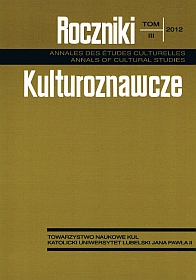The Concept of One God in Islam
Abstract
The Islamic dogma of the One and Unique God introduces the concept of a transcendent God, the true being, the absolute Lord of the worlds to whom everything will return at the Last Day. The denial of this truth and associating with Him partners is idolatry, and it is an unpardonable sin. Such a concept of God guarantees the unity of the material and spiritual world. Man, discovering the Law of Unity, acquires a knowledge of the one God and consciously submits to His will according the innate Religion of Islam. God who is Almighty, Hidden, and full of wisdom (transcendence) is close to His creation and reveals himself through His “remnant” (immanence), which are the “Excellent Names of God”. The man answers to His presence with the love that he feels in mystical experience. In this way, the mystic frees himself from the world of multiplicity in order to be annihilated in Unity. Everyday life of a Muslim is the praise of the One God for His transcendence, thanksgiving for His immanence and mercy, and worship for His greatness.
References
Abdullah Yūsuf ʿAlī: The Meaning of the Holy Qurʾān. Beltsville, Maryland: Amana Publications 2008 (http://islamicbulletin.org; http://www.quran4u.com/Tafsiraya [dostęp: 10.08.2011]).
Abu al-Qasima al-Qusayri: Ar-Risala al-Qusayriyya czyli Traktat o sufizmie. Przeł. J. Nosowski. Warszawa: Wydawnictwo Akademickie Dialog 1997.
Al-Ghazali: Iḥyāʾ ʿulūm al-dīn. http://www.ghazali.org/site/ihya.htm [dostęp: 12.08.2011].
Amin Ahsan Islahi: Surah Ikhlas http://www.renaissance.com.pk/febqurex99.html [dostęp: 10.08.2011].
Arnaldez R.: Le Coran. Guide de lecture. Paris: Desclée 1983.
Bielawski J.: Islam, religia państwa i prawa. Warszawa: Wiedza Powszechna 1973.
Brown R.: Who was ‘Allah’ before Islam? http://www.themicahmandate.org/2009/03/who-was-%E2%80%98allah%E2%80%99-before-islam-1/#identifier_0_1394 [dostęp: 10.08.2011].
Corbin H.: Historia filozofii muzułmańskiej. Przeł. K. Pachniak. Warszawa: Dialog 2009.
Danecki J.: Podstawowe wiadomości o islamie. Wyd. 2. Warszawa: Dialog 2007.
Dictionnaire du Coran. Red. Mohammad Ali Amir-Moezzi. Paris: Robert Lafont 2007.
Gaudefroy-Demombynes M.: Narodziny islamu. Przeł. H. Olędzka. Warszawa: Państwowy Instytut Wydawniczy 1988.
Gimaret D.: Les noms divins en Islam. Exégèse lexicographique et théologique. Paris: Les Éditions du Cerf 1988.
Hadith Collection (Sahih Bukhari, Sahih Muslim, Malik’s Muwatta, Shama-il Tirmidhi, Fiqh-us Sunnah, Abu Dawud). http://www.hadithcollection.com/ [dostęp: 10.08.2011].
Khoury A. Th., Hagemann L. [et al.]: Dictionnaire de l’Islam. Histoire – Idées – Grandes figures. Belgique: Brepols 1995.
Kitab Sh.: Rozwój koncepcji Boga w kulturze arabskiej przed islamem. Toruń: Wydawnictwo UMK 2002.
Koran. Tłum. J. Bielawski. Warszawa: PIW 1986.
Kościelniak K.: Sunna, hadisy i tradycjonaliści: wstęp do tradycji muzułmańskiej. Kraków: Wydawnictwo Unum 2006.
Krąpiec A., Maryniarczyk A. (red.): Powszechna Encyklopedia Filozofii. Lublin: Polskie Towarzystwo Tomasza z Akwinu 2000-2009.
Lane E.W.: An Arabic-English Lexicon. Beirut: Librairie du Liban 1968.
Lings M.: What is suffism? Lahore: Suhail Academy 2005.
Muhammad Taqi Misbah Yazdi: Islamic Gnosis ('Irfan) and Wisdom (Hikmat). „Al-Tawhid Islamic Journal” vol. 14: Fall 1997 no. 3. Qum – Iran. http://www.al-islam.org/al-tawhid/islamic_gnosis_wisdom/title.htm [dostęp: 8.08.2011].
Nosowski J.: Teologia Koranu. Wykład systematyczny. Warszawa: ATK 1970.
Otto and the Numinous. http://academic.brooklyn.cuny.edu/english/melani/gothic/numinous.html [dostęp: 12.08.2011].
Pismo Święte Starego i Nowego Testamentu. Biblia tysiąclecia. Wyd. 5. Poznań: Pallottinum 2002.
Pismo Święte Starego i Nowego Testamentu: Stary Testament. Poznań: Księgarnia Św. Wojciecha 2003.
Shi’ah. http://www.momin.com/Books/Shi039ah-26/Chapter+Four-164.html [10.08.2011].
Sura Ikhlas. http://www.alseraj.net/maktaba/kotob/english/quran/TheLight/english/quran/light/112/112_1-4.htm [dostęp: 10.08.2011].
Tafseer Surat al-Ikhlâs. http://thequranblog.wordpress.com/2008/04/22/tafseer-surat-al-ikhlas [dostęp: 10.08.2011].
Tafsīr al-Ṭūstarī. http://www.altafsir.com [dostęp: 10.08.2011].
Tafsīr Ǧalālayn. http://altafsir.com [dostęp: 12.08.2011].
Tafsīr ibn Kaṯīr. http://www.qtafsir.com [dostęp: 10.08.2011].
Tawhid. http://en.wikipedia.org/wiki/Tawhid [dostęp: 10.08.2011].
Warren P.: Is the Word Allah Similar to Elohim? http://www.plim.org/1Allah.html [dostęp: 10.08.2011].
Zuberi R.M.: The Image of God. http://home.comcast.net/~rzuberi/articles/The_Image_of_God.pdf [dostęp: 12.08.2011].





